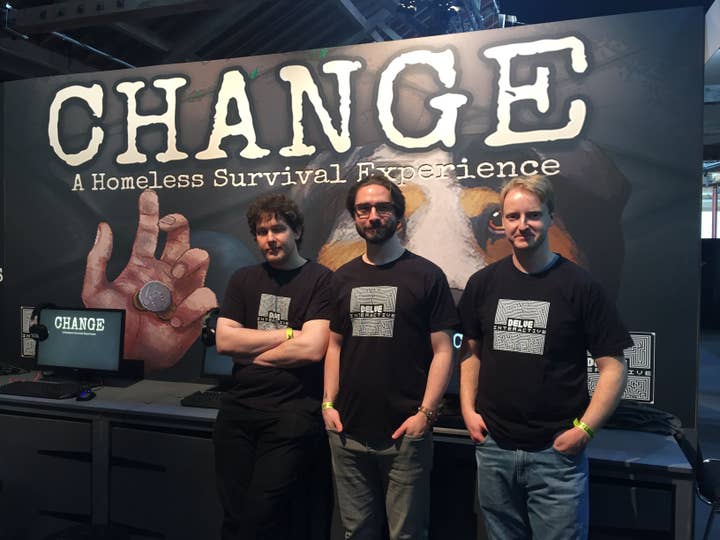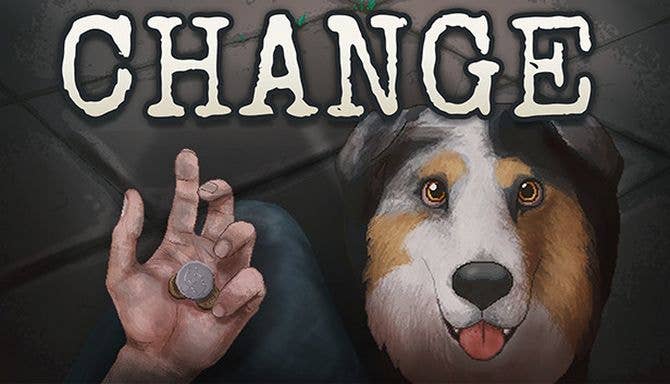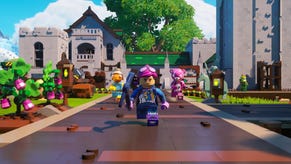Challenging player entitlement by making them homeless
Homelessness is "intimidating for any artists who really wants to take it seriously” says Delve Interactive founder Danny Hayes
After scrimping and saving my pennies, I finally had the £11 required to buy a library card. This was my ticket off the streets, to a better life. I could read books to keep my spirits high, and level up that all-important knowledge stat. It wouldn't be long until I was off the cold streets and away from the uncaring throngs of people who treated me worse than the garbage I was frantically collecting to sell for handfuls of loose change.
It wasn't soon after this Change: A Homeless Survival Experience stopped me dead, informing me that I had spiraled into hopelessness and would likely spend the rest of my life on the streets. I may have bought the library card, but I hadn't eaten, washed, or slept indoors for days. My middle-class entitlement and decades of gaming left me focusing on the wrong things. Being homeless was something I was trying to trying to win, rather than just survive.
Education serves as the foundation for middle-class values and aspirations, and collecting random junk is a core tenet of gaming. Neither, however, prepare you for the homeless experience: it's savage, unforgiving, and lonely. Change challenges that player entitlement and the idea that if you just collect enough stuff for the next upgrade, you'll ultimately succeed.

Developed by Delve Interactive, Change arrived on Steam Early Access late last year, and is the product of a frightening failure. The studio's first and only title prior to Change was 2D platformer Poncho -- a game which the team celebrated the launch of by writing out their CVs for a day job.
"It didn't do anywhere near as well as we hoped, and we sort of put all our eggs into that basket," Delve founder Danny Hayes tells GamesIndustry.biz. "We took out loans, we quit our jobs, all that stuff. And when it didn't do well, we were in such a bad financial situation we realised that without our friends and family, we would have been on the streets.
"It's just coming to the realisation that without a safety net, it's easy to fall into that pit. So it inspired me to do something about it, and create something that gave people more of a voice, and educated people. I was getting annoyed, especially around the stigma that has been building around homelessness at the same time as it rising out of hand."
"It's just coming to the realisation that without a safety net, it's easy to fall into that pit"
Over the last nine years, homelessness has more than doubled in the UK. According to housing charity Shelter, there are over 320,000 homeless people in the country. The figure is, by Shelter's own admission, likely an underestimate and does not account for sofa surfers, or people living in accommodation like sheds or cars.
Brighton and Hove, one of the UK's main game industry hubs, has the second highest rate of rough sleepers in the country behind only Westminster in London.
"Because I've been years in the games industry, I've spent most of my career working in either Brighton or London," Hayes adds. "It's been a case of walking past dozens of people every day, and always the same people. When you've got a job and you're walking past the same people every day, if you work that job long enough, you can see people sink faster. It's pretty horrible."
Change sees you play as one of multiple characters, including someone with mental illness, a drug addict, or someone just like Hayes but who wasn't fortunate enough to have that safety net. Each character comes with their own set of unique circumstances that impacts their life on the streets. These are delicate topics that need to be handled with care, and Hayes says he has read countless studies, and spoken with numerous homeless and formerly homeless people in an effort to capture the experience.
"If you start looking at homelessness you realise it's not just about homelessness, it's about relationship breakdown, addiction, mental health"
It's still a game however, and Hayes says it look a long time to get that balance between "a very depressing experience and an engaging one." But representing the experience of homelessness with sensitivity remains a challenge, especially in regards to the female experience.
"The most common reason for female homelessness is the breakdown of relationships or the escape from abusive relationships -- they run out of the house and have nowhere to go," Hayes adds. "It happens quite a lot. The other main issue they have is sex on the street, which is actually coined as a term 'survival sex' where you need to get off the street for the night.
"It's one of the more dark ones that we're working on. I think people know about drug abuse and the darkness that holds. Whatever I throw at them, they will know that's coming. But I think with female homelessness and abusive relationships, it's going to be maybe be a bit triggering for some people."
Hayes is aware that his previous march towards precipice doesn't necessarily mean he can write the game from a place of experience, but says if you "put the hours in" researching, it's "just a matter of translating that empathy."
"The game is slightly romanticised in that it's a bit of an empathy engine that's meant to make you feel for homelessness," he adds. "Some corners are rounded, but it's definitely difficult."
The portrayal of homeless people in the media, and games in particular, was another motivator for Hayes, who said he felt angry at games like Bum Simulator that treat the issue in a "disgusting way."
"I felt that games specifically needed to have a serious voice to show that we can do okay with this kind of stuff," he adds.
"Maybe it's because pre-2000 every portrayal of homelessness was more comical because of the mental health issues, and people maybe didn't understand it back in the '80s and '90s, and would be more likely to make fun of it as a joke and show characters who are just crazy.
"It's intimidating for any artists who really wants to take it seriously. If you start looking at homelessness you realise it's not just about homelessness, it's about relationship breakdown, addiction, mental health and you've got to do all these things together in order to do it justice."
After more than four years in development, Change is scheduled to release later this year, and 20% of profits will be donated to homeless charity Crisis.







.jpeg?width=291&height=164&fit=crop&quality=80&format=jpg&auto=webp)

